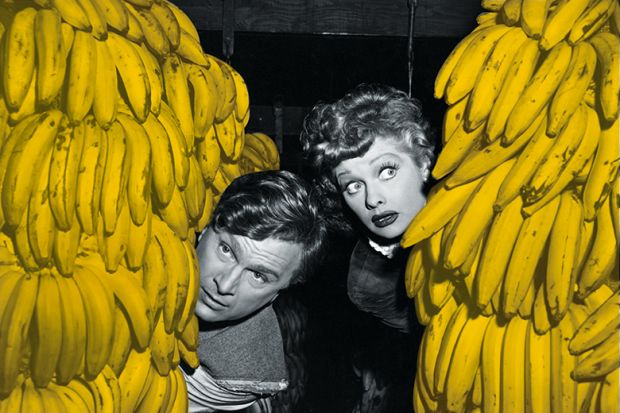Last year was unpredictable and perplexing for everyone, university staff included. What we all need is a clear road map for 2018: reliable, evidence-based forecasts and solid projections drawn up by the experts in their fields. However, while we wait for those to materialise, here are some wild extrapolations and overreaching speculations for the post-fact era on what UK universities can expect in the 12 months to come.
January
In a move to quell growing academic unease on the impact of Brexit on research, the government directs the Arts and Humanities Research Council to fund new research into farce. A spokesman says: “We look to the AHRC to develop a stronger national understanding of the microstructure, impact and scale of tragicomedy that uses buffoonery and horseplay with a special focus on crude characterisation and ludicrously improbable situations. Through Brexit, we are redefining farce for a new age, but there is a lack of deep understanding of its complexity. Alongside big data, nanotechnology and the internet of things, we believe that the UK can lead the world in tomfoolery.”
As the deadline for university submissions to the next teaching excellence framework looms, Scottish universities move to address concerns that “overenthusiastic” celebrations of Burns Night may have impacted on the quality of their written submissions. “We would like to emphasise that we have taken the process seriously – but we would ask assessors to disregard anything stated in 16pt Comic Sans,” a spokeswoman says.
February
The Office for Students moves to reassure the sector that it has no plans to use its new bailiff-style powers of entry and search. “We do not anticipate that this power will be exercised in anything but the most extreme of circumstances, such as an institution in gross breach of its fiduciary duties, on the verge of bankruptcy or facing potential criminal proceedings. Or possibly in the event of a discourteous tweet from a marketing department. We’re still thinking it through. Sorry, did I say that bit about the tweet out loud?” says a spokesman for the OfS, from the executive washroom of the vice-chancellor’s suite at the University of Oxbridge.
Despite huge demonstrations on many campuses and on the streets of London, Donald Trump hails his state visit to the UK a success, and tweets “They love me here! Fake news pedlars can say what they like but everywhere I went I distinctly heard thousands of beautiful students and scholars inviting me over for coffee!”
The House of Lords votes to declare that the Student Loans Company lacks the capacity to feel pain or emotions.
March
Universities UK faces flak as a Freephone helpline for vice-chancellors distressed by press coverage of their salaries is launched on 0800-GLBL-MRKTPLCE, while a parallel premium-rate hotline is opened for rank-and-file academics upset over the falling value of their incomes on 070-AUSTERITY.
In a further attempt to respond to public concerns over fair access, London Metropolitan University sets up an extensive outreach programme to attract more public school pupils. “We have summer schools with discounted Pimm’s, and walk-in kiosks at all the major gymkhanas in the South East,” a spokesman says. “We are only too aware of the importance of social inclusion. We will take a contextual approach to admissions – having vast sums of inherited wealth will be no impediment to studying at London Met. Our extensive buddy system and teams of accountants in the Isle of Man, Guernsey and the Cayman Islands will ensure that no trust-fund beneficiary is left behind.”
April
In the Spring Statement, the chancellor of the Exchequer denies plans for the wholesale privatisation of the higher education sector, as plans emerge to offer discounts for first-time buyers. “It is important to recognise that many billionaire multinational publishing behemoths don’t always have the cash to hand to buy a whole university,” the chancellor says. “I am therefore announcing measures that will enable young, first-time university buyers additional discounts and grants to help them take that next all-important step on the road to ever-greater profitability. Buying your first university is hard, particularly in London.”
With the conclusion of the TEF subject pilot, the OfS confirms that, in line with the confidentiality agreement with participating universities, it will not be announcing the results. “We are delighted that our secret results show that so many institutions in so many subjects have done so much for students – or perhaps have treated them with utter disdain. This shows that UK higher education does, or perhaps does not, provide an excellent set of learning opportunities. We hope that the sector takes on board the lessons of these results.” Although not involved in the pilot, Durham University launches an appeal against the results anyway.
Attempts by the newly launched UK Research and Innovation to improve the quality of social media posts by academics ahead of new impact metrics descends into chaos as universities’ peer review process for tweets creates an 18-month publication lag. Donald Trump makes up for the delay by retweeting former London School of Economics historian David Starkey’s entire back catalogue.

May
The OfS reacts to concerns that the TEF is administratively burdensome by announcing a pilot scheme in which permission to raise fees will be based on the performance of each institution in television quiz University Challenge. But the pilot is hastily abandoned when UCL loses more than £76 million in a single evening when undergraduate physicist Mr J. Henderson incorrectly identifies Rodgers and Hammerstein as the composers of the 1980s Eurovision-winning pop hit Making Your Mind Up.
In a welcome break from financial and political upheaval, universities achieve unexpected success in the Royal Horticultural Society Chelsea Flower Show. Among the medallists is the University of London, with its controversial project, titled: Those Five Other Winning Gardens Are Actually Ours. However, the award to the joint submission by Oxford and Cambridge – an expansive, innovative installation hailed by judges as “an impressive project” – is rescinded when it is discovered that it was not actually an entry but the county of Kent.
Times Higher Education publishes the entire set of leaked TEF subject-level pilot results.
June
As financial pressures on universities mount, a number of institutions launch “Tyeach”: an Uber-style, pay-as-you-go “hire a tutor” app. Students indicate where they want to go with their learning and then wait while roving part-time “lyecturers” choose whether to pick up the request. The University and College Union welcomes the development. “This casual, unpredictable, uncontracted, volatile scheme provides many part-time academics with a higher level of employment certainty than most have ever enjoyed previously,” a spokeswoman says.
UUK indicates that many vice-chancellors are “passionately opposed” to Brexit but are reluctant to speak out for fear of press criticism of their salary. Responding to suggestions that they take a 30 per cent pay cut and speak their mind, a spokesman says: “No, thank you; we’re good.”
Fears that the OfS is becoming “drunk with power” grow as reports emerge that the body’s answering machine message is now just: “Mwahahahahahaha.”
July
League tables based on reputation ratings receive a blow as the non-existent University of Stonehenge, the University of St Peter’s and the Salisbury-Bloomington Research Institute have their graduates rated by graduate employers as among the highest in the UK for enterprise, leadership and dynamism. “We recruit barely 10 graduates a year, mostly from Warwick. Or is it Coventry? I think that it’s Coventry. I went to Warwick. We literally have no idea what happens in any other universities, apart from what we read in the papers or when they have people on Newsnight,” an industry insider remarks.
Universities minister Jo Johnson berates the sector for failing to address grade inflation as it emerges that every single student in the UK has been awarded a first-class degree this year. “I was only registered on a pre-access taster course,” Moira Smith from Kettering tells one foaming tabloid, “but I seem to have been awarded a first. What is a first? I thought that it was a kind of bus.”
UKRI moves to clarify that the figure of 2.5 outputs per researcher for the 2021 research excellence framework is an average. This follows the publication of multiple research articles that only get as far as data description and then stop. A number of economics journals are baffled by all the fuss, noting that this approach has, in fact, been the practice in their discipline for several years.

August
National Student Survey scores are released. After criticism by the Advertising Standards Authority over self-congratulatory league table hype, university press officers with little to do are reduced to standing in chorus outside deans’ offices on competitors’ campuses, chanting: “You’re barely satisfactory and you know you are” and “You’re getting an action plan in the morning.”
The exercise is then thrown into chaos as it is revealed that Ipsos Mori employed the same telephone interviewers for the NSS as for the 2018 World Wrestling Federation TV Viewer Satisfaction Survey. In a statement, the polling company says: “We would like to apologise to universities for this mix-up. However, I am sure that the sector will be pleased to see that 78 per cent of students definitely agree or mostly agree with the statement: ‘The fighting on my course has been awesome.’ ” Among other results, 85 per cent of students agree with the statement “I have received sufficient advice and guidance in relation to the Monday Night Raw Elimination Monster Fest Summer Slam Face Off.” In a related development, a WWF spokeswoman says: “We are assured by Ipsos Mori that this mix-up will not happen again. However, we are pleased to note that 77 per cent of our viewers felt that “feedback on the No Holds Barred Last Man Standing Slugfest 18 sponsored by the Coca-Cola When It’s Gone, It’s Gone Summer Promotion, has been timely”.
September
Building on the success of its Extra scheme for students who have not received any offers, Ucas launches the Super Extra Double Plus scheme for students who didn’t even apply to university. “We recognise that there is a segment of our market who literally can’t be bothered getting out of bed to hit three buttons to apply but whose overwhelming sense of entitlement is such that they assume university entrance will somehow happen by itself,” a spokeswoman says. “Our Super Extra Double Plus scheme means that all students have to do to apply is to blink one eyelid twice. Or three times if they are considering medicine.”
The OfS announces that participation in the TEF will become compulsory for all English institutions with at least one student from August 2020.
October
In a shock move designed to appease Brexiteers, UK Visas and Immigration is merged overnight with the Quality Assurance Agency. With immediate effect, all entrants to the UK are tested on their knowledge of the UK external examining system. The new citizenship test also includes multiple-choice questions on degree-awarding powers, student complaints and appeals. A spokesman comments: “If they get any of them right, they’re out.”
After complaints that the TEF does not actually measure teaching, the OfS announces plans for TEF9, which will rate every single lecture in the UK as gold, silver or bronze. A spokesman explains: “This will involve remote observation by digital artificial intelligence, which will rate each session in real time through the use of metrics such as the number of instructor ideas articulated per minute, the percentage of students nodding in agreement and the number of students still awake after 50 minutes. Our benchmark work indicates that more than 60 per cent of students awake will be satisfactory.”
November
The Student Loans Company, Ucas and Caravans UK merge. “We believe that this will enable us to connect students to their preferred higher education provider and accompanying student debt more efficiently, while simultaneously managing their longer-term expectations about getting on to the housing ladder,” a spokesperson says.
The OfS announces that the TEF will be compulsory for all UK organisations from 2021, even if they provide no higher education whatsoever. “We are concerned that some people might be learning things accidentally, with absolutely no metrics in place to assess it. And we can’t be having that,” a spokeswoman says.
December
Additional evidence emerges of universities’ forays into the further education market as UUK announces a new vice-chancellors’ apprenticeship scheme. “We don’t want people who have only a theoretical understanding of higher education running universities. We want to give young people practical on-the-job experience of running a multimillion-pound research and teaching institution,” a spokeswoman explains. While initially sceptical, the sector acknowledges the success of Susan Jones, 17, who doubled recruitment to the University of Northern England overnight with the slogan: “Come to the University of Northern England. Or not. See if I care. *Shrugs*”. But sector recruitment specialists remain unimpressed by claims of her groundbreaking marketing genius, with one telling the BBC: “That proposition has essentially been the recruitment strategy of the Russell Group for the past 50 years.”
Patrick McGhee is assistant vice-chancellor at the University of Bolton. He writes in a personal capacity.
And across the pond? Predictions for the US academy
Graduate schools
In 2018, the US will regain its status as the global leader in science. That destiny became clearer in November, when the House of Representatives passed a bill requiring graduate students to pay taxes on their “tuition waivers”: that is, on money that was never given to them. One PhD candidate reported that he would be paying 41 per cent of his $32,500 salary as income tax, while the final bill has the highest earners paying 37 per cent. Although the PhD provision was eventually dropped from that bill, it was a clear illustration of the trickle-up economics that Republicans assure us will Make America Great Again. A Republican lawmaker cited a number of recent studies, including one showing that people are most productive when they eat ramen noodles for lunch. Another Republican congresswoman, mistakenly believing that she was speaking off the record, said: “The best way to incentivise science is to impoverish the people doing it.” Since those comments were revealed, her approval ratings have soared. “Finally, someone willing to speak truth to out-of-touch elites,” a Republican voter in Alabama declared.
University administration
As the number of doctorates awarded continues to rise even while tenure-track openings continue to diminish , PhD candidates nevertheless have reason to be hopeful that they may yet land a university job. This is because many university administrators are finally heeding calls to hire more donor affair coordinators, managing vice-chancellors, external relations officers, executive deputy directors, community outreach supervisors, investor partnership chairs, alumni relation managers, assistant college deans, and administrative associate provosts. If you are a recent PhD graduate unsure of your future, I would recommend going to universitytitlegenerator.com for some inspiration.
Academic social networks
In 2018, Humanities Commons and Scholarlyhub are poised to replace ResearchGate and Academia.edu as the dominant academic social networks (full disclosure: I work at Academia.edu). In my experience, social networks succeed when they create network density, user-friendly interactions and figure out ways of getting their users to post amazing content. And the enterprises best suited to do those things almost always have tax-exempt status. This is why everyone famous tweets on Mastodon (a non-profit alternative to Twitter) and everyone not famous shares news on Diaspora (a non-profit alternative Facebook). Scholarlyhub recently announced its financial model and it is one that has a proven track record of driving engagement and adoption: placing a paywall in front of the “upload a document” button.
Digital humanities
In 2018, digital humanities will continue to make inroads into the lagging student enrolment figures in history, philosophy and English. This became all the more apparent after news broke that the US government granted $350,000 to the University of Southern California’s Tracy Fullerton to produce a video game “based on the writings and reflections of Henry David Thoreau”. At the modest price tag of $19.99, players of Walden, A Game, can re-enact the life of Thoreau, building a cabin, gathering food and exploring nature. “If you spend too much time working,” writes Smithsonian magazine, “the woodland’s radiant colors fade and the music… quiets to a dull heartbeat.” This is an example of digital humanities money well spent: teaching a critical, life-long lesson to millennials who spend the wee hours of the morning playing video games: don’t work too hard.
Zachary J. Foster is a product manager at Academia.edu and recently completed his PhD in Near Eastern Studies at Princeton University.
POSTSCRIPT:
Print headline: Keep your eyes peeled
Register to continue
Why register?
- Registration is free and only takes a moment
- Once registered, you can read 3 articles a month
- Sign up for our newsletter
Subscribe
Or subscribe for unlimited access to:
- Unlimited access to news, views, insights & reviews
- Digital editions
- Digital access to THE’s university and college rankings analysis
Already registered or a current subscriber? Login






